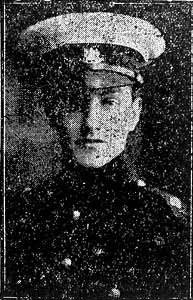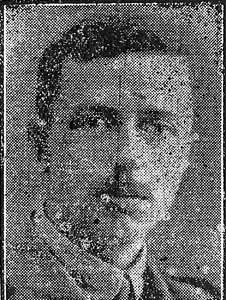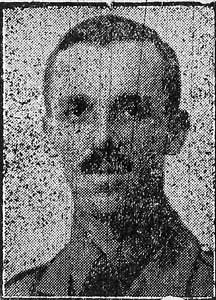
'THE GREAT WAR', 'THE WAR TO END WAR', 'WORLD WAR 1'
'What passing-bells for these who die as cattle?
- Only the monstrous anger of the guns.'
from 'Anthem for Doomed Youth'
by Wilfred Owen
1914 - 1918
'Oldham Terriers - Their Part in the War'
by Sergeant Maurice Bradbury, M.M.
Oldham Territorials, 1/10 Battalion, Manchester Regiment
Transcriptions of the series of articles published in the 'Oldham Standard' in Spring 1919.
JOURNEY TO GALLIPOLI Different from the journey from "Blighty" to "Alec," there was no convoy of ships from Port Said to Gallipoli. Men were needed badly on the Peninsula and as each ship was laden it sailed individually and it was found later, landed its troops without waiting for the rest of the Division to arrive. When the Haverford drew away from Port Said those aboard could almost have closed their eyes and imagined themselves on a pre-war Mediterranean trip. The sun was warm and the sky speckless blue reflected in the smooth swell of the ocean, but there were real signs of war aboard, grim and foreboding as they always are, if one looked beneath the surface. Men looked business-like and hopeful, the nonsense and carelessness had gone from their eyes, and there was more than one who gazed towards the unseen shore with the questioning look in his eyes, "Will it be my luck to stay or return?" Then there were a few bluejackets aboard tending the submarine gun and a couple of gunners from the Queen "Lizzie" who had all been in the naval part of the landing and who told tales of it which sounded to untried soldiers like stories from the Arabian Nights. In a small room adjoining the Battalion Orderly Room there lay the kits and swords of officers of the glorious Twenty-ninth Division, many of whom, the sailors told, were killed before ever they got near the land. Officers had gone with kits and swords only to call [?] it a miraculous achievement even to put foot on the Peninsula with the clothes they stood up in and arms.
But in spite of this grim evidence of what had been, and what might be, the spirit of the troops was excellent. That, many old soldiers will say is a stock military phrase, but in this case they will bear out the writer in saying it was a true one. No troops in the world could have been more cheerful or confident, and the mutual feeling of good fellowhip between officers and men would scarcely be understood by the latter-day troops of the war. The sail represented three days of perfect calm before the most cruel and awful of storms. Men played on the sun-warmed decks and twitted each other, and the riding horses which occupied the top deck seemed to ask with their eyes what it was all about. Most of the boys spent what money they had left on articles in the canteen; and the writer remembers well how one of two boon companions secured the last bottle of beer aboard the Haverford with his last sixpence (borrowed). When he was handed the bottle he was subjected to an internal battle. On the one hand he thought of his friend languishing with thirst on the hot deck and on the other he thought how nice it would be to drink the whole bottle to himself. Eventually self won and he hugged the bottle close to his breast and crept surreptiously towards a concealed boat on the upper deck. There, after peering round to see no one had 'spotted' him he uncorked the elixir and gently raised it to his mouth, but before he could swallow the first mouthful a red face, wreathed in ingratiating smiles, appeared over the deck side and wished him a gentle good day. It was his friend of the eternal thirst, the human camel, who could detect the frothy liquid miles away. The moral of it all is never to try and do a pal down. On the evening of the third day out the men heard for the first time the sound of battle in the form of the heavy naval guns bombarding the Turkish positions, and this grew in volume every hour that passed, until the following day it was an angry roar and on the horizon were squat looking black shapes from which occasional flashes and puffs of smoke were emitted. One shape larger than the others and more formidable looking, was made out to be the then famous Queen "Lizzie", and by evening the Haverford lay within a few hundred yards of this monster battleship and she trembled and lurched like a drunken man when the fifteen inch guns spoke. The sight that night as the transport lay off Cape Helles was one which burnt itself into the very heart of every man there. When night came the narrow strip of land was like a slice from hell and all the more awesome because none amongst the boys could understand it; it was their first experience of modern war fought with modern weapons, it was an illustration of science gone mad. A battle was in progress, and there was no time to land the men to make them a deciding factor in the game, so that for several hours they crowded the deck rails and looked with wonder at the scene unfolding itself before them, the upturned fortress guns on the head of the Peninsula, a galloping despatch rider, making for general headquarter, the million streaks of fire spat from machine guns, and the air dotted with white feathery puffs of bursting shrapnel, and occasional columns of water around them where Turkish shells struck the sea in an endeavour to hit the ship. When darkness came properly lights of all colours could be seen on the first slope of Achi Baba, and flashes of fire high overhead denoted bursting shrapnel, and all the time the British men o' war formed a menacing ring round the neck of land, and incessantly caused black looking explosions on the sides and top of Achi Baba, the second Gibralter. The men on board the Haverford asked one another what could have become of the rest of the Division and the 10th Battalion, as nobody knew whether the other two companies had landed or had still to follow them up. During the night the Haverford started her engines again and moved away from the Peninsula, and curiousity grew keen as to where the "Anzacs" had tried to land further up the coast, and was then about turned again, and taken into the Mudros Harbour. Only the General Staff of that time can give the reason for these various moves. Away again where the sounds of battle were but very faint, the men turned in on themselves for amusement, and that night a concert was organised, at which the commanding officer, Colonel Rye, presided and songs and recitations and stories were sung and told by officers and men. One can close his eyes and again picture Mudros harbour, as he saw it that night with its string of protective mines at the entrance, and the beauty of an eastern night over the rippling silver of the bay, and strains of music floating from a battleship close by. The night was full of romance, for not a man there but what did not understand, after what he had seen that day, what tremendous possibilities the morrow held, for they knew there would be no mistake then, rumours a thousand they had laughed at or believed and passed on, but now the morrow certain would bring battle and --- for some death. And yet the spirits rose and men were eager in the most cases to test their training and fitness because they had yet to learn the horrible strain of the trench life of the early war days. There were, however, some who may have thought of the wives and children, mothers and sisters at home, men who were older and could see things more nakedly than the younger and more carefree of the lads, and these listened to the faint ominous rumbling of the guns with feelings of wonder, but with fixed soldierly faces which said plainly that not a care or a memory in the world would ever make them shirk their duty. The concert was an excellent tonic for all these feelings aroused by the day's experiences, for to make men laugh and especially a Tommy, is to make them forget all trouble and live only in the present. Major Wilde and Lieut. Griffiths contributed largely towards doing this and the Colonel enjoyed the jokes and songs as much as any Tommy present. The next morning the Haverford was again nosing her way for the Peninsula and late in the afternoon she re-appeared off Cape Helles and in full view of the battle which had now become less violent. A naval cutter swung alongside the ship and large flat rafts were tugged to the side and men began the descent of rope ladders from the dizzy top deck, carrying full field marching order and 120 rounds of "ball" and if anybody is desirous of an exciting and horrible sensation he is advised to climb down a rope ladder from the top deck of a liner and, if he is lucky, drop on a raft which is bobbing about like a cat on hot bricks and he himself loaded like a Christmas tree or a camel. Luckily in this case it was accomplished without a casualty, thanks to the characteristic nimbleness and ingenuity of Private Tommy Atkins, who can do anything in this world except believe that a man can be a sergeant-major and a Christian at the same time.
|
'Oldham Men's Fights on Many Battlefields' |
Final Days in Egypt |
Journey to Gallipoli Part 3 |
March to Gallipoli Trenches |
Gallipoli's Decisive Battle |
Return to Cape Helles |
The Battle of Romani |
Approach to the Trenches |
Horrors of Ypres in 1917 |
Greatest Battle of All Times |
The Grand Slam
~~~~~~~~~~ Weeks of Continuous Fighting ~~~~~~~~~~ Oldham Lads Face Hail of Bullets ~~~~~~~~~~~ A Glimpse of Unsurpassed Heroism |
Last Stages of the Struggle |
Transcriptions by Sheila Goodyear :


